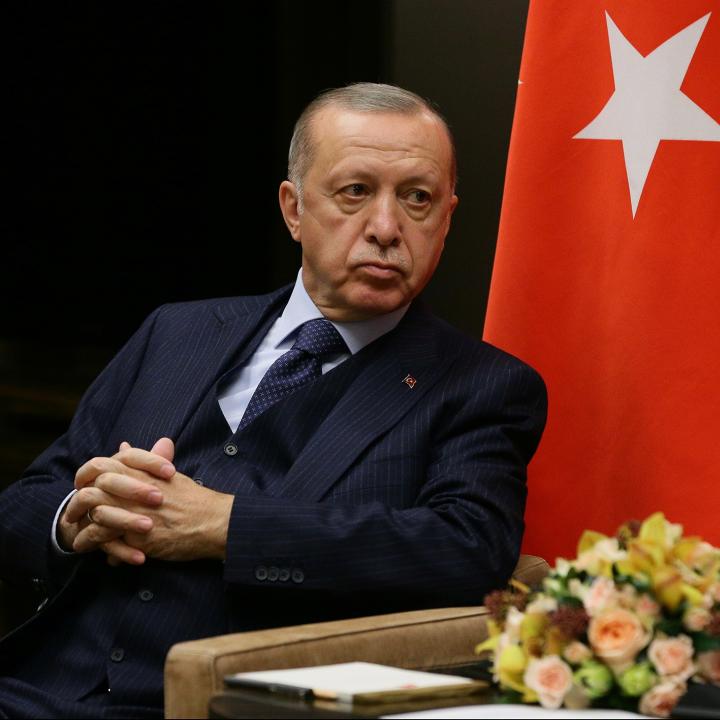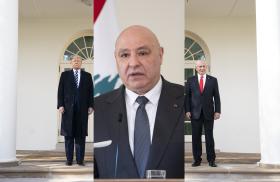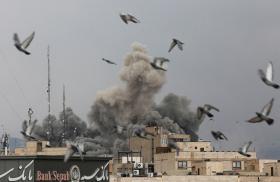
- Policy Analysis
- PolicyWatch 4107
Erdogan vs. the CHP: What’s Next in Turkey’s Political Battle?

The Turkish president has shown he will use harsh tactics to suppress the popular opposition party, but his future decisions could still be swayed by domestic protests, economic factors, and geopolitics.
On September 15, a Turkish court postponed until October 24 its ruling on whether to nullify the November 2023 convention of the country’s main opposition Republican People’s Party (CHP) based on fraud allegations. A ruling to declare the convention “completely null and void” could pave the way for Turkish President Recep Tayyip Erdogan to replace current CHP chair Ozgur Ozel with a handpicked candidate. The court’s measured delay follows massive CHP-led protests across Turkey in reaction to the case.
Turkey’s slide from democracy under Erdogan has been well documented. According to Freedom House, Turkey—which in 2010 was grouped with southeast European countries like Albania on democratic freedoms—now finds itself in less respectable company, including among Middle East states like Iraq. Yet even considering this deterioration, Erdogan’s full-scale charge against the country’s leading opposition party—coupled with the March 19 arrest of Istanbul’s CHP mayor and likely presidential candidate Ekrem Imamoglu—stands out for its brazenness. Fundamental questions arise: Why is Erdogan intensifying his crackdown now, what are his goals and next steps, and will the CHP survive?
Popular Mayor vs. Forever President
Erdogan has won fifteen nationwide votes—some of them referendums—since becoming prime minister in 2003. The strong economic growth he delivered after coming to power allowed him to build a base of adoring supporters. Meanwhile, an ineffective opposition led by the CHP, which for nearly two decades was garnering just over 20 percent of the vote, helped Erdogan greatly. But with Turkey’s economy volatile since 2018, Turkey’s president has had to rely on his control of election boards, state institutions, courts, and the media to tilt the vote in his favor.
The entry into politics of Imamoglu, who won the Istanbul mayoral race in 2019 and then again in 2024, has changed this balance, with the CHP politician defeating the president’s mayoral candidates despite the advantages afforded by Erdogan’s incumbency. Imamoglu, a charismatic and relatable social democratic politician, has built a broad coalition of voters surpassing Erdogan’s. Following his sweeping win in 2024, the mayor started to signal that he would run against Erdogan in the next presidential election—the suspected reason for his March arrest. Now Imamoglu—who was indicted on charges ranging from money laundering to mismanagement of contracts, based on testimony by anonymous witnesses—will undoubtedly remain in some form of legal custody so long as Erdogan is president.
CHP Comeback
The mayor’s arrest hardly solves the president’s bigger “CHP problem”—i.e., a formidable comeback by an opposition party that looked moribund only a few years ago. As the party of Turkey’s founder, Mustafa Kemal Ataturk, the CHP in the twentieth century embraced secularism, a strict separation between politics and Islam. In the 1970s, under charismatic leader Bulent Ecevit, it also adopted a social democratic and pro–working class identity. The party’s popularity nosedived during the 1990s, however, due to ineffective leadership, abandonment of its working-class base, and the loss of nationalist voters to other parties.
The CHP has made a comeback in recent years for the following reasons:
- Imamoglu has reconnected the CHP to lower-middle-class and working-class voters, restoring a crucial component of the party’s historic brand from Istanbul, the country’s largest city and its financial and manufacturing hub.
- Ankara Mayor Mansur Yavas, who boasts a Turkish nationalist pedigree, has restored the party’s nationalist credentials from Turkey’s capital city and second-largest metropolitan area, located in the Anatolian heartland.
- Party chair Ozgur Ozel, who hails from Manisa, a province abutting Izmir, Turkey’s third-largest and most secularist metropolitan area, has revitalized the CHP by bringing its three ideological wings—secularist, Turkish nationalist, and social democratic—under unified leadership.
- Finally, CHP mayors, holding power in the country’s key metropolitan areas since 2019, have proved themselves to be good public administrators, launching key metro and public transportation connections, expanding culture and welfare programs, and making the CHP the party of good governance in the eyes of the voters.
These developments together have convinced voters for the first time since 2003 that the CHP can run Turkey well, and better than Erdogan’s Justice and Development Party (AKP). Consequently, the CHP has been leading the AKP in opinion polls since 2024, when it first trounced the party in nationwide municipal and local contests.
Erdogan’s Next Steps
The CHP in its entirety has emerged as a serious political threat to Erdogan. Accordingly, he will continue seeking to suppress the party, drawing on his control of the courts, national institutions, and the media.
Prosecutors will likely launch additional cases against CHP mayors and other officials, with the courts continuing to sack and jail them and find replacements from within the party’s opposing wings in order to stoke internal party strife. The courts will also intentionally keep cases against the CHP and its leaders open-ended, a situation that applies especially to Imamoglu. Erdogan believes that time is on his side, and he has proven that he can shape the media narrative regarding court cases. Massive demonstrations protesting Imamoglu’s arrest in March have since diminished, and the CHP’s polling lead against the AKP has narrowed, giving some credence to the president’s belief that time is his best ally against the CHP.
Potential Outcomes
Erdogan will undoubtedly keep working to wear down the CHP, but the extent of his measures remains open to speculation, as does the resilience of Turkish democracy and the country’s oldest political party. Some possible outcomes are:
Effective CHP civil war. Erdogan would like to see the CHP deplete its time and energy on unending court cases and for party factions to fall prey to infighting. In this ideal scenario for Erdogan, internal strife would make the party appear chaotic—and, once again, unfit to govern—allowing the AKP to restore its lead in the polls.
CHP resilience. After a period of chaos, CHP factions could again unite under the greater party banner. Considering the toxicity of party officials potentially selected by the courts, and notwithstanding a possible CHP civil war in the short term, such a scenario appears plausible in the middle to long term.
Near police state. A third possible outcome, which could coexist with either of the first two, would be a deeper crackdown against the CHP that sparked larger and persistent mass protests. Amid the authoritarian response, Turkey would begin to resemble a police state, with long-term bans on freedom of expression, assembly, association, and media. In this scenario, Erdogan might even consider postponing elections, especially if the country’s economy does not recover before the next presidential vote.
Battle of attrition. Predicting Erdogan’s likely next steps requires consideration of structural dynamics—but also of the president’s limitations. Working against him are several factors:
- The size of Turkey’s middle class, which largely backs the CHP.
- The extent of its civil society organizations, many of which sustain the opposition.
- The age and agility of its institutions—e.g., the CHP is more than a hundred years old.
- Deep cultural and political ties to Europe.
- Perhaps most important, Turkey’s complete integration into global markets, which can react to events in ways Erdogan cannot control.
The Ankara court’s decision to delay its verdict concerning the CHP and its chair appears to be rooted as much in fear of larger protests as in negative reaction by the markets. Erdogan cannot shut down the CHP unless he chooses to turn Turkey into a complete police state, a development that will almost certainly ruin the country’s economy.
Implications for U.S. Policy
With surveys showing that nearly two-thirds of Turkish respondents believe Imamoglu has been jailed for political reasons, the struggle between Erdogan and the CHP remains far from resolved. Ultimately, Turkey’s citizens will be pivotal in deciding the country’s future leadership.
For their part, successive U.S. administrations—Democratic and Republican alike—have prioritized America’s strategic relationship with Turkey, a key NATO ally, despite the country’s democratic backsliding. The Trump administration could continue such a policy, mindful of Turkey’s status as a rising middle power in the current era of great power competition.
However the U.S. government proceeds, it should closely monitor Turkey’s domestic developments, given their potential impact on Ankara’s foreign policy. A decisive CHP surge could result in Erdogan reverting to nationalist politics to boost his base, such as on the Kurdish issue, including by renewing Ankara’s hardline stance toward U.S. cooperation with the Kurdish-dominated Syrian Democratic Forces in Syria. In another scenario, Erdogan might close ranks with the Trump administration on Syria as well as other regional and global issues to burnish his strongman image, while simultaneously cracking down on the CHP.
Soner Cagaptay is the Beyer Family Senior Fellow at The Washington Institute and director of its Turkish Research Program.



